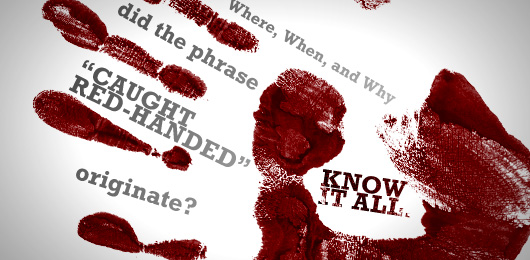Everybody has that moment when they realize they don’t know about something that they should probably know about. Whether it’s history, language, science, or cultural phenomena, you’ve felt the stinging personal embarrassment of a moment wherein you realize there’s some common knowledge that isn’t so common. Don’t feel bad; nobody knows everything. Nobody, that is, except me and my sidekick, The Internet!
Somewhere in the world, a confused soul begs the question…
Where, When, and Why Did the Phrase “Caught Red-Handed” Originate?
Truthfully, I could tackle the origins of an oft-used idiom with the Know It All Unstoppable Machine of Fact-Finding (patent pending) every week for a year, if I wanted to – there are more than enough of them, out there. I will not pursue this course, however, because even after a year, I still wouldn’t come close to covering the whole English conversational language. Oh, and I would also bore myself to death after the third week.
That being said, examining the history of an expression from time to time can lead to learning some pretty interesting information that will undoubtedly be used to shame an arrogant wordsmith at a future social gathering and so I felt we should do it at least once before the year is out.
“Caught red-handed” is one of those few phrases with a definition that is essentially the same today as it was hundreds of years ago and yet, the specific event(s) that brought about the actual conception of the phrase remains a point of contention.
One interpretation (and probably the most accurate, in my estimation) links it to 15th century Scotland, where the word appears in print several times as a direct allusion to law enforcement being able to identify violent criminals because of victims’ blood on the perpetrators’ hands. For example, one excerpt from Sir George Mackenzie’s A Discourse Upon the Laws and Customs of Scotland in Matters Criminal (1674) mandates that the sheriff cannot proceed against a criminal unless “[the criminal had been] taken red-hand”.
Another prominent (and older, more general) theory behind the birth of “red-handed” is similar to the Scottish account but applies to the bloodied hands of desperately hungry, impoverished citizens who would poach livestock from others in their community. Yikes.
Fun fact: the now-standard phrase of “caught red-handed” is believed to have first appeared in Alfred Lawrence's 1857 novel Guy Livingstone, or, “Thorough”.
Though the phrase is now used more to describe the apprehension of someone stealing an object (no matter how trivial) rather than the legal means to indict a person who robbed another creature of life, being “caught red-handed” has never been associated with a positive experience. Thus, I hope you were only wondering about its origins due to profound curiosity, not because of impending murder charges after a trip back in time.
















